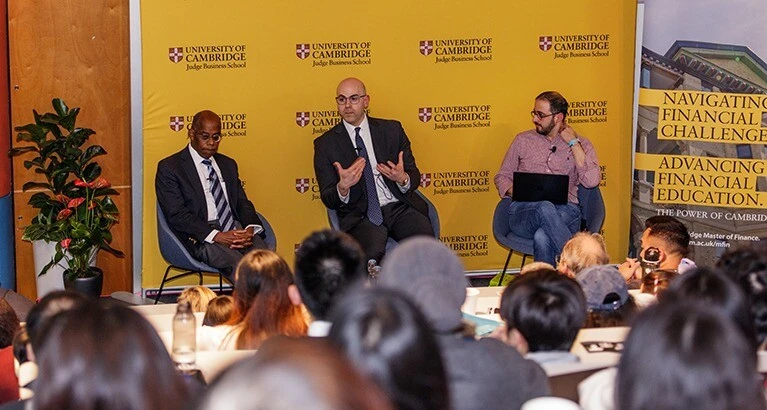US Federal Reserve Governor Stephen Miran, speaking at a 12 November event at Cambridge Judge Business School, said that data showing inflation above 2% is too focused on “backward-looking” housing information and called for an easing of US monetary policy.
Economist and former Federal Reserve vice chairman Roger Ferguson, who appeared with Miran at the standing-room-only event, said the Federal Reserve faces inflation well above the 2% target along with a labour market that “appears to be a little soft”, so there is wide division among Fed members.
The event introduced by Professor Gishan Dissanaike, Dean of Cambridge Judge, was attended by about 200 people in the main lecture hall at Cambridge Judge and was streamed live with people joining from across the world. Organised by the Alumni & External Engagement team at the Business School, the event quickly attracted news coverage from Bloomberg, Reuters and other media outlets.
Housing and immigration policy linked to inflation trends
The way we measure inflation lags behind where the market is in a significant way.
Speaking at a fireside chat hosted by Kamiar Mohaddes, Director of the Global Executive EMBA at Cambridge Judge, Miran said: “The way we measure inflation lags behind where the market is in a significant way.” He added: “To keep policy so tight in response to an artefact of the statistical measurement process rather than any actual supply-demand imbalances in the economy will then create the labour market weakness that we were tasked with avoiding.”
Miran said there was already a cooling down of housing costs, partly due to changes in immigration policy under President Trump, whose Council of Economic Advisers Miran chaired before being named to the Federal Reserve post in October and placing himself on leave from the Council. Miran also criticised as a “phantom” statistic the impact on the inflation figure when higher investment-management fees are triggered when stock markets rise, describing it as “kind of nutty” for rising stock markets to be counted toward inflation.
Fed faces uncertainty over next interest rate move
The dilemma for the Fed is that inflation is well above the 2% target.
Ferguson, vice chair of the Federal Reserve from 1999 to 2006 and a current member of the Advisory Board of Cambridge Judge, said he expects the Federal Reserve will move cautiously in loosening interest rates because the labour market is hard to read owing to the changing nature of immigration in the US.
“The dilemma for the Fed is that inflation is well above the 2% target,” said Ferguson. “The next step is far from certain. You have a tightly divided Fed.”
Both Miran and Ferguson said they are confident that the dollar will remain the key international reserve currency for the foreseeable future, and there also was a consensus that dollar-linked stablecoins may be most attractive to investors in other countries including those who lack faith in their countries’ financial system.
Climate, politics and Fed independence debated
Asked about the current COP30 climate-change summit in Brazil and whether climate change may influence monetary policy, Miran said it was “not appropriate for the central bank to look at climate issues” as this could spill over into politics and threaten the Federal Reserve’s independence. Ferguson said it was very important for markets and citizens to understand why the Federal Reserve makes decisions in the way it does, adding that the public, journalists and markets sometimes “read too much into things” to misrepresent the Federal Reserve’s future intentions.
Featured faculty
Kamiar Mohaddes
Associate Professor in Economics and Policy
Director of the Global Executive MBA Programme
Advisory Board
The members of Cambridge Judge Business School’s Advisory Board provide a wealth of experience and insight and are drawn from a diverse range of companies and international organisations including the energy, charities, retail, construction and finance sectors, amongst others.





